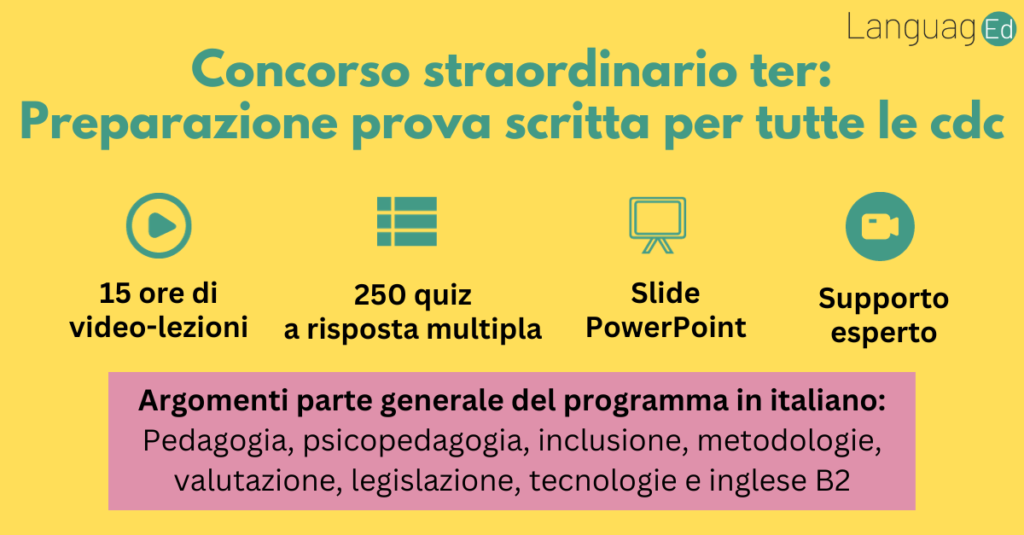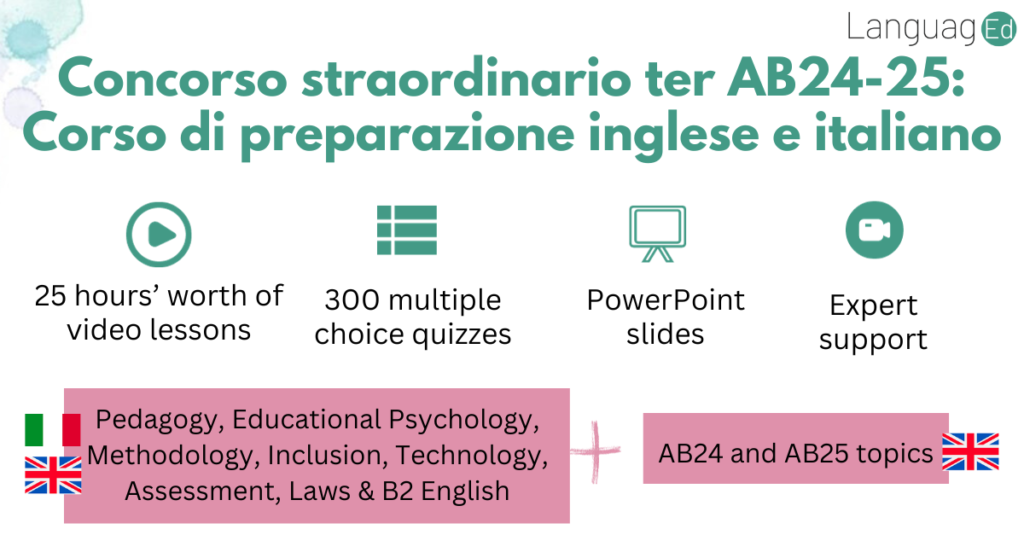Articolo aggiornato dopo la pubblicazione del bando del concorso straordinario ter in data 11 dicembre 2023
L’attesa è finita: il bando per il concorso straordinario ter è stato pubblicato in data 11 dicembre.
A seguito di questo annuncio, abbiamo ricevuto molte email con richieste di chiarimenti su:
- modalità di espletamento del concorso
- che cosa studiare
- quali corsi LanguagEd scegliere per prepararsi
In questo articolo, rispondiamo quindi a tutte le domande che ci sono pervenute e facciamo il punto delle informazioni finalmente ufficiali.
Infine diamo indicazioni su quali corsi LanguagEd privilegiare per la preparazione al concorso docenti 2023 per facilitare lo studio a chi vuole portarsi avanti.

1. È uscito il bando per il concorso straordinario 2023?
Il bando per il concorso straordinario (denominato però sul sito del ministero “concorso ordinario 2023”) è uscito con Decreto Dipartimentale n. 2575 del 6 dicembre 2023.
2. Quale sarà il formato delle prove d’esame?
Come abbiamo già anticipato all’uscita del decreto che regolamenta questo concorso, il concorso comprenderà due prove:
- Prova scritta a risposta multipla con 50 quesiti
- Prova orale di progettazione didattica + domande disciplinari

3. Che cosa bisogna studiare per la prova scritta del concorso docenti?
La prova scritta riguarderà i seguenti 8 argomenti:
- Pedagogia
- Psicopedagogia
- Inclusione scolastica
- Metodologie didattiche
- Valutazione
- Uso efficace delle tecnologie digitali
- Inglese B2
- Legislazione scolastica e documenti chiave
Per approfondire questi 8 argomenti, vai alla nostra guida dedicata.
Uno degli argomenti fondamentali, per esempio, è la valutazione:
4. Ci sarà una prova preselettiva?
No, nel concorso straordinario ter non ci sarà una prova preselettiva ma solo prova scritta, prova orale e valutazione titoli.
5. La prova scritta sarà uguale per tutti?
Sì, la prova scritta comprenderà 50 quesiti a risposta multipla, ognuno con 4 opzioni di cui solo una corretta, e sarà identica per tutte le classi di concorso e i posti.
La prova si svolgerà al computer in italiano.
6. Che cosa bisogna studiare per la prova orale?
Per la prova orale, bisognerà sia rispondere a domande specifiche sulle materie della propria classe di concorso, sia dare prova di essere in grado di progettare un’attività didattica.
Per scoprire di più sulla prova orale, leggi il nostro articolo.
7. Quali corsi LanguagEd sono adatti a studiare per questo concorso?
Per studiare per il concorso docenti 2023, ci sono due corsi LanguagEd che sono stati scritti appositamente.
Il primo è valido per la preparazione alla prova scritta uguale per tutte le classi di concorso:

Il secondo comprende sia la preparazione alla prova scritta in italiano, sia le materie disciplinari di didattica delle lingue per le classi A24, A25 e B02:

7. I corsi LanguagEd saranno aggiornati?
Noi aggiorniamo sempre i nostri corsi, seguendo anche in diretta lo svolgimento delle prove concorsuali in modo da aggiungere nuove risorse che aiutino i nostri docenti in base all’andamento delle prove.
Per esempio, durante il concorso ordinario 2021, non appena abbiamo ricevuto l’informazione che molte domande si concentravano sulla corrispondenza tra descrittori e livelli CEFR, abbiamo immediatamente aggiunto dei quiz e una guida in merito a tutti i nostri corsi.
8. Se concorro per AB25 (inglese nella scuola secondaria di I grado), devo studiare letteratura, storia e civiltà per la prova orale?
La risposta breve è sì.
In primo luogo, la letteratura e la storia dei Paesi anglofoni fanno parte della parte specifica del programma concorsuale per AB25, il cui secondo punto recita:
“conoscere e saper esporre la cultura e civiltà dei paesi in cui si parla la lingua oggetto d’esame, con particolare riferimento agli ambiti storico, sociale, letterario, artistico ed economico, nonché alle varietà linguistiche dell’inglese, dai World Englishes, all’English as a Lingua Franca”
In secondo luogo, alcune domande a risposta multipla di letteratura, storia e civiltà sono uscite nei concorsi ordinari anche AB25.
Ricordiamo inoltre a titolo esemplificativo le seguenti tracce a risposta aperta per AB25 dei concorsi 2016 e 2021:
Remember, remember the Fifth of November,
Gunpowder Treason and Plot,
I know of no reason
Why the Gunpowder Treason
Should ever be forgot.
Guy Fawkes, Guy Fawkes, t’was his intent
To blow up the King and Parli’ment.
Three-score barrels of powder below
To prove old England’s overthrow;
By God’s providence he was catch’d
With a dark lantern and burning match.
Holla boys, Holla boys, let the bells ring.
Holloa boys, holloa boys, God save the King!
And what should we do with him? Burn him!
How would you use the rhyme above to teach your students about Guy Fawkes Day celebrations, which is also called Bonfire Night? Briefly outline the historical event the celebration commemorates and explain the significance of the event (Traccia AB25, 2021)
“The Shakespearian linguistic legacy is not in the number of words he used, but in the way he used them. From Shakespeare we learn how it is possible to explore and exploit the resources of a language in original ways, displaying its range and variety in the service of the poetic imagination. In his best writing, we see how to make a language work so that it conveys the effects we want it to. Above all, Shakespeare shows us how to dare to do things with language” (David Crystal, 2003:77).
Briefly discuss the above statement with reference to how you would introduce Shakespeare to your students. Define how you would use Shakespeare’s works and why, the school level and the main focus of your activities (Traccia AB24-AB25, 2016)

Spero che questo aggiornamento ti sia utile! Se hai domande sul concorso, sul bando o sui nostri corsi, compila il modulo e saremo lieti di aiutarti:


I corsi LanguagEd sono quelli che rispondono meglio alle esigenze di chi vuole passare il concorso docenti!
Grazie cara, much appreciated. BTW sembra quasi che io mi sia scritta il commento da sola, ma è un caso di omonimia! 🙂
I corsi LanguagEd sono quelli che rispondono meglio alle esigenze di chi vuole passare il concorso docenti!
Hi Chiara!
Please could help me understand what the requirements are for a BB02 conversation teacher to do the concorso. I have been working in an equivalent primary school since 2015 so I only have one year experience in a secondary school. I am in the GPS as a BB02 conversation teacher since last year. I am working full-time again at primary because there were no hours for me at secondary school this year.. Can I do the “concorso? Thanking you in advance.
Hi Teresa!
So for the new concorso straordinario ter, the requirements should be 3 years of experience teaching and/or the 24 CFU, which I’m not sure if you have. However, this is provisional information, so I would encourage you to check the official requirements, which we’re only going to find out once the bando di concorso is published. This should happen soon so keep your eyes peeled. If you have any further questions, then or now, I’m always happy to help.
All the best,
Chiara
Hi Chiara,
Loving your site! I’m evaluating which course to pick and I have some doubts about the requirements for the written exam for BB02.
As I’ve understood from research the 24 cfu and experience isn’t necessary for BB02, but I can’t find clear info as to whether we will have to do the 50 multiple choice questions uguale per tutti.. are you able to help?
thanks in advance
Hi Kate,
Thank you for your kind words! Re: BB02, yes, based on the bando, you will have to do the 50 multiple choice questions in Italian (including the 5 questions on B2 English=, just like all the other classi di concorso. It boggles the mind that BB02, AB24 and AB25 would be asked to do the 5 B2 English questions but this is what the bando states. The oral exam will then be specific for each classe di concorso, so it will be in English for BB02.
If you’re considering studying with our courses, you can choose from the one that preps you for the multiple choice quiz in Italian only or the one that preps you for the multiple choice quiz + also covers the main topics for the oral exam. As you can see from the BB02-specific syllabus, the last 4 topics (i.e. the ones related to language teaching and language acquisition) are exactly the same as AB24-25. What our course doesn’t cover is the “culture” topics for BB02, but the rest is there.
I hope this is clear and helpful and don’t hesitate to get in touch at chiara@languaged.org if you’d like to have a chat.
All the very best and good luck with the exam!
Chiara
That’s really helpful, thank you so much!